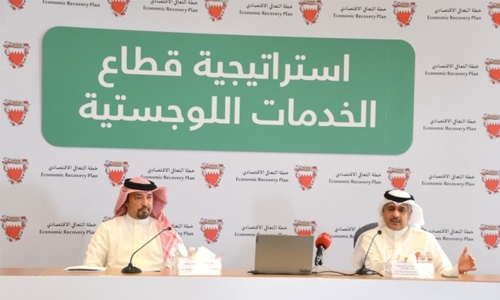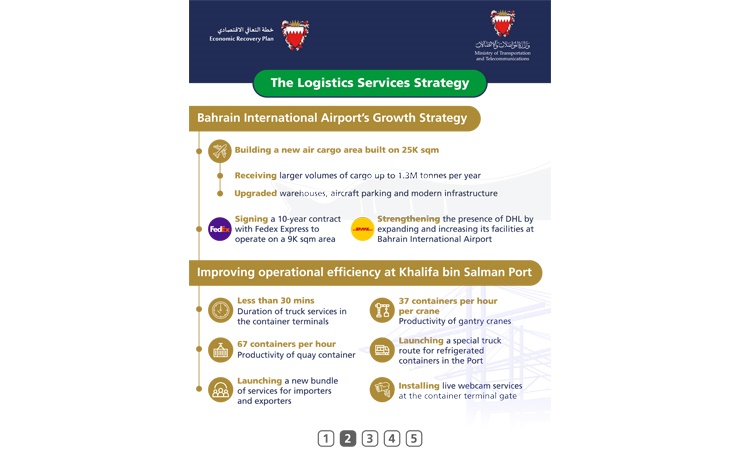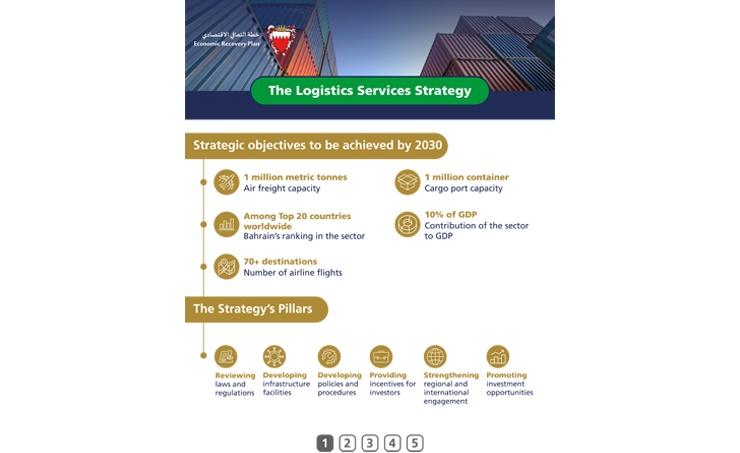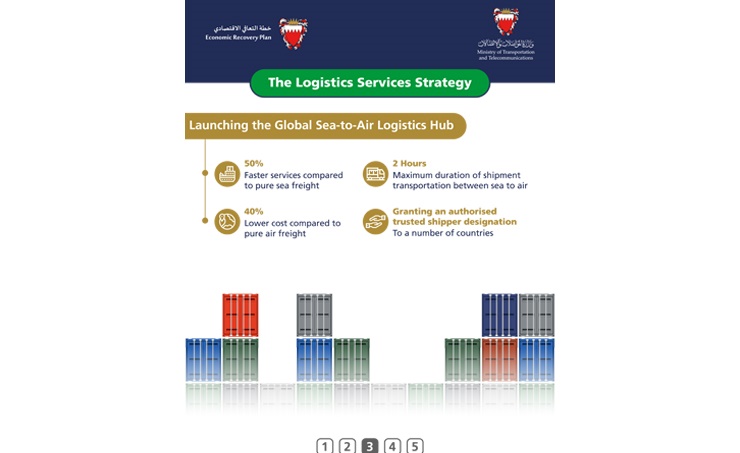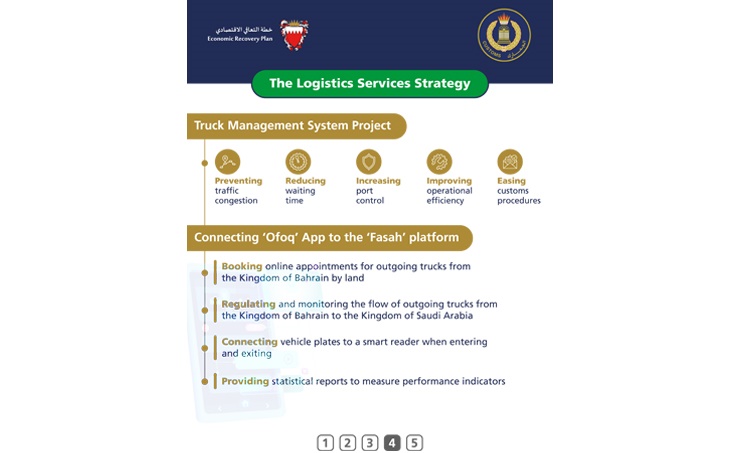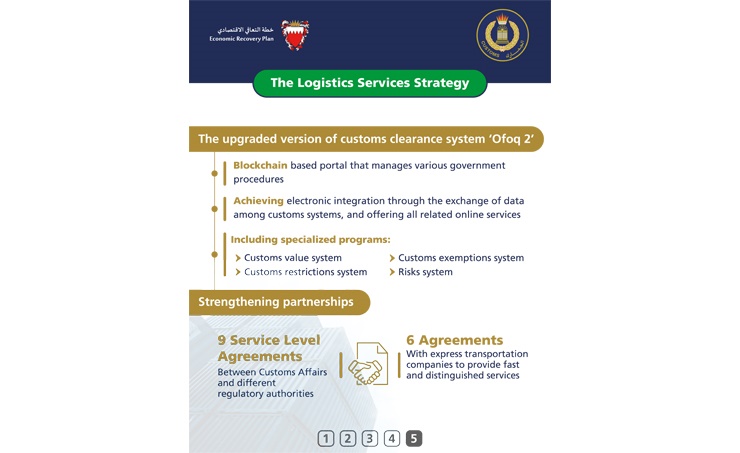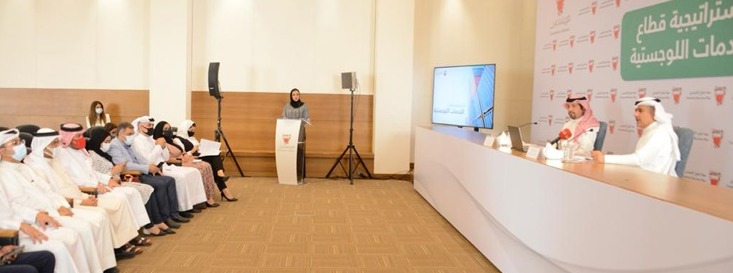Bahrain unveils strategic plan for strengthening logistics sector
TDT | Manama
The Daily Tribune – www.newsofbahrain.com
Minister of Transportation and Telecommunications Kamal bin Ahmed Mohammed has revealed the details of Bahrain’s Logistics Services Sector Strategy as part of the Kingdom’s wide-ranging Economic Recovery Plan.
The strategy was designed to capitalize on Bahrain’s strategic geographic position, while uplifting logistical capacity across several services and expanding their offerings to position Bahrain as one of the top 20 global destinations for logistic services by 2030.
Speaking at a press conference to explore the strategy, the minister, alongside the President of Customs, Shaikh Ahmed bin Ahmed Al Khalifa, detailed the main targets of the strategy and ongoing efforts to increase the logistics services sector’s contribution to GDP in 2030, to 10%.
The minister outlined that the continued development of the logistics services sector is closely aligned with Bahrain’s Economic Vision 2030, noting that it is a priority sector for the Government of Bahrain due to the significant role it plays in attracting investments and creating jobs for citizens.
He highlighted the strength of the logistics infrastructure in the Kingdom, reiterating that it serves as a strong foundation to build on in pursuit of this ambitious strategy.
The strategic objectives of this strategy anchor on clear indicators to be achieved by 2030, which include reaching an airfreight capacity of 1 million metric tonnes, reaching a cargo capacity of 1 million containers, and increasing the number of airline destinations to over 70, he added.
Discussing the strategy’s key pillars, the minister stressed that they rest on several strategic initiatives that focus on reviewing laws and regulations, developing infrastructure facilities, enhancing policies and procedures, providing incentives for investors, promoting investment opportunities while strengthening regional and international engagement.
Turning to Bahrain International Airport’s Growth Strategy, the Minister pointed out that the Ministry of Transportation and Telecommunications has adopted a multifaceted plan that hinges on the building of a new 25,000 square metre air cargo area, which allows for receiving larger volumes of cargo up to 1.3 million tonnes per year.
This includes upgraded warehouse, aircraft parking and stat-of-the-art infrastructure, he added.
This will support the government's Economic Recovery Plan and its ambitious targets through transforming the logistics and airfreight sector into one of the most important active economic sectors in the Kingdom.
The minister explained that the new air cargo area is located north of the runway at Bahrain International Airport and will double the airport’s ability to accommodate larger flows and volumes of shipments.
The minister also spoke about the signing of a 10-year contract with FedEx Express to operate a 9,000 square metre area, while underscoring the efforts in place to strengthen the presence of DHL in Bahrain by, expanding and increasing their facilities at the Bahrain International Airport.
The Minister spoke about the role of the Khalifa bin Salman Port in providing logistics services, capitalizing on its strategic location in the Salman Industrial Area, only 13 kilometres from Bahrain International Airport, allowing easy access to Saudi Arabia via the King Fahad Causeway, at a distance of no more than 30 kilometres.
He indicated that the port was built on an area of 110 hectares of reclaimed land and includes a berth of 1800 meters in length and includes a container terminal on an area of 900 square metres.
Four gantry cranes are used in the port that can handle container ships with a width of 61 metres, in addition to facilities for handling and storing general cargo, ro-ro ships and passenger ships.
He added that Khalifa bin Salman Port is also preferred due to its strategic location in the middle of the Arabian Gulf region, the deep-water berths it embraces, and the entry channel to receive the new generation of giant container ships.
Another advantage is the availability of direct landlines to Saudi Arabia and the Arabian Gulf states, which placed it as a major regional centre for distributing trade in the region.
Kamal Ahmed added that APM Terminals - the leading port operator - operates, manages and develops the port under the supervision and control of Ports and Maritime Affairs, following the concession contract concluded between the Government of Bahrain and the operating company.
Discussing digital transformation in the port, the minister mentioned that the Vessel Traffic Management System (VTMS) had been replaced by a new and advanced one that increases efficiency and enhances accuracy to ensure the safety of maritime navigation.
This has been compounded by the launch of the CSMI electronic platform to pre-disclose the arrival of ships and utilize all the resources necessary for docking in the port, in addition to the launch of the electronic platform LIFT, which allows customers to pre-book and pay fees to receive incoming containers.
Moving to operational efficiency at the Khalifa bin Salman Port, the minister noted the key attributes that distinguish the services it delivers, highlighting that it only takes less than 30 minutes for trucks to complete their services in the container terminals.
The productivity of gantry cranes has increased to 37 containers per hour, while the quay container productivity has increased to 67 containers per hour, he added.
The Minister said that a new bundle of services for importers had been launched including a special truck route for refrigerated containers.
He recalled the recent launch of the fastest Global Sea-to-Air Logistics Hub in the region, which affirms Bahrain’s strategic position midway between European and Asian markets as well as its proximity to regional target markets.
Establishing the most efficient multimodal sea-air transhipment hub in the region with a global reach will play a key role in realizing our targets for the logistic services sector, he remarked. He Kamal Ahmed explained that the Global Sea-to-Air logistics hub can lead to 40% cost savings compared to airfreight only and 50% faster lead times than pure sea freight, with only a two-hour turnaround time for all containers.
He outlined the global interest in this service and confirmed that several countries have been designated as the authorized trusted shipper, the most recent of which was Brazil.
The President of the Customs spoke about the role Customs Affairs play in reinforcing cross-government efforts to develop the logistic services sector across a range of workstreams, in line with the objectives of the customs affairs strategy 2021-2024.
He underlined that Bahrain has succeeded in protecting the health and economic security of the community from the repercussions of the global spread of COVID-19, and is now on the path to achieving an economic recovery through a forward-looking plan with clear targets.
As part of the Logistics Services Sector Strategy, Shaikh Ahmed shared the details of the truck management system project that solves for preventing traffic congestion, reducing waiting time, and increasing port control.
This project has allowed both importers and exporters to facilitate the movement of trucks at the port, by booking an appointment in advance through the "Fasah" platform of the Saudi Tadawul Company, improving operational efficiency and easing customs procedures at the port, he noted.
Shaikh Ahmed added that that work is underway to link the “Ofoq” system to the “Fasah” platform, to regulate and control the flow of trucks originating from the Kingdom of Bahrain to the Kingdom of Saudi Arabia.
In this regard, he said that the “Fasah” platform is linked to a smart vehicle plate reader system for entry and exit and provides several statistical reports to measure performance indicators.
He clarified that activating the truck appointment management system will support the facilitation of trade between the Kingdom of Bahrain and the Kingdom of Saudi Arabia, and will achieve several objectives pertaining to the ease of movement of goods and swifter service delivery.
The President of Customs stressed that the "Ofoq 2” system is among several digital transformation initiatives being adopted by Customs Affairs.
These initiatives enable regulatory authorities to prepare statistics and performance indicators, link them with the modern radiology systems and electronic portals at ports, in addition to using the best smart solutions and artificial intelligence applications such as the Block Chain technology, to achieve electronic integration and data exchange facilitating an efficient “port community”, he said.
Speaking about the advancement of “Ofoq 2”, Shaikh Ahmed added that he has just signed a contract with the Singaporean company CrimsonLogic to that effect and noted that this new partnership will see wider developments to the efficiency of the system and align it further with international best practices, as part of the Logistics Services Sector strategy.
The new developments will introduce “Block chain” technology that enhances the accuracy of digital customs transactions, maintain their confidentiality, and reduce human intervention.
"Ofoq 2" is characterized by a developed risk system that works on various customs data, an electronic portal that includes services related to beneficiaries, a data model for processing sea and air manifests according to the nature of transport, in addition to the possibility of hosting the system on cloud computing services, he said.
To this point, he stressed the commitment of Customs Affairs to provide the best solutions and services and adopt the most effective practices, by consolidating partnership with all parties concerned with the customs process.
“Ofoq 2” will play a central role in achieving electronic integration through the exchange of data between electronic systems operating within customs, and providing all related electronic services, including to companies operating ports, agents of ships and freight, owners of goods and various authorities.
Shaikh Ahmed explained that “Ofoq 2” includes specialized programs that include a customs value system, a customs exemption system, a customs restrictions system, and a risk system.
He noted that nine service level agreements were signed between Customs Affairs and several various regulatory authorities, in addition to six agreements signed with express transport companies, to provide fast and distinguished services to customers.
Related Posts

